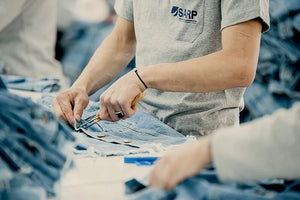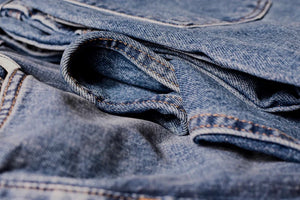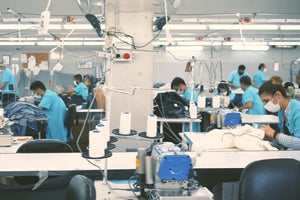Fair working conditions in jeans production
Jul 12, 2019
More than 60 million people work in the textile and clothing industry worldwide. Many of these workers are exposed to health and social risks. But there is another way. At TORLAND, we ensure that standards for occupational safety and workers' rights are adhered to.
Growing cotton
The industrial cultivation of cotton not only pollutes the environment, but also endangers the health of field workers and the population. Large quantities of pesticides and herbicides are usually used to protect the vulnerable cotton monocultures from pests and to eliminate weeds. Field workers are often not adequately protected against the chemicals that are hazardous to health. The occurrence of serious diseases of the skin, eyes, respiratory tract or nervous system is not uncommon. 1,2
TORLAND only uses organically grown cotton for its jeans. This differs from industrial farming in that only organic fertilizers and pest control are permitted. Mixed crops are usually grown, which are less susceptible to pests. By avoiding chemicals, field workers are exposed to fewer health risks . 14
Organic cotton is mostly grown by small farmers who cannot afford the expensive chemicals and harvesting machines. It is therefore preferable to conventionally grown cotton for social reasons. 15 Our article The difference between organic cotton and conventional cotton lists many other advantages of organic farming.
Jeans manufacturing
The majority of jeans bought in Europe are made in China or Bangladesh. 1 With a daily working time of 12 to 13 hours and a 6-day week, the workers usually only earn low wages, which are not enough to finance accommodation, food, health care and the education of their children 1,3,4 . Unfortunately, this often also applies to the legally set minimum wage. In addition, women usually earn significantly less than men. At peak times, the seamstresses do piecework for up to 16 hours, 7 days a week. 1 Violations of local or international occupational health and safety regulations are punished very leniently or not at all. It is not uncommon for female employees in particular to work to the point of exhaustion and collapse in the poorly ventilated factories.
In 2013, the collapse of a factory building in Bangladesh caused a great stir. More than 1,100 people died in the rubble and more than 2,000 were injured. It was later revealed that several Western textile companies had their goods manufactured there. Thanks to the public attention this disaster generated, conditions in many factories have improved. However, many textile factories still lack basic equipment such as fire alarm systems. 1
At TORLAND, we do not work with production facilities in the Far East. Our partner company in Izmir complies with the strict occupational health and safety regulations in Turkey and pays fair wages. We regularly visit our production facilities to see this for ourselves.
Used look – a special feature of jeans
The fashion trend of recent years to wear jeans with a "used look" is leading to further risks for the environment and workers. New jeans are supposed to look like they have been worn several times and worn out due to tears and faded color. But this look comes at a high price 4,5 . In Far Eastern countries such as China and Bangladesh, jeans are sandblasted without respiratory masks. 4 The quartz-containing particles contained in the jet reach the lungs and can cause severe silicosis, an incurable respiratory disease that can lead to lung cancer and tuberculosis 6 . This work practice was banned in Turkey in 2009.
Unfortunately, such processes are still used in less controlled countries such as Bangladesh, China and Pakistan. 7,8 In addition, highly toxic chemicals are often used to bleach or dye the textiles. This exposes the workers to a high health risk. 1
But there is another way: At TORLAND we avoid processes that are hazardous to health. We use the stonewashing method to give our jeans a modern look. The jeans are washed in special machines with lava stones. Since our jeans do not contain any dangerous chemicals, no harmful ingredients can get into the wastewater.
social benefits
In many textile producing countries, there is still no state-run occupational accident insurance 9 . For workers, illness not only means financial loss due to absence from work but also unaffordable health care.
These workers are often poorly informed about their rights, so they do not make use of the international human right to form a union. It is not uncommon for plantation or factory owners to actively prevent unions from forming in order to prevent the empowerment of the workforce. 1
At our partner company in Izmir, all employees are subject to statutory social insurance . In addition, the trade union landscape in Turkey is characterized by a large number of small and medium-sized unions that are organized in trade union federations. There are currently three large employee trade union federations that are members of the European Trade Union Confederation (ETUC). 16
Certifications to improve employee and environmental protection
In order to improve working conditions in the textile industry internationally, various institutions are committed to ensuring compliance with guidelines.
Such guidelines are set, for example, by the Business Social Compliance Initiative (BSCI). This code of conduct was established by the Foreign Trade Association. The standards set are cross-industry and are based, among other things, on the UN Declaration of Human Rights, the UN Conventions on the Rights of the Child and on the Abolition of All Forms of Discrimination against Women. Regular checks are intended to guarantee the promotion and maintenance of these standards. 10,11
The non-profit organization Sedex (Supplier Ethical Data Exchange) regulates the Exchange of information on such standards via a common online platform. Performance verified in audits in the areas of working conditions, occupational safety, the environment and ethical business practices are disclosed there, which enables a mutual exchange of knowledge and thus greater transparency across the supply chain. 12,13
Our partner company in Izmir is certified once a year according to the Global Organic Textile Standard (GOTS) . This means that they are committed to the ethical and environmentally conscious production of our jeans.
Impressions from our partner company in Türkiye
Credentials:
- https://www.bmz.de/de/themen/textilwirtschaft/hintergrund/index.html
- http://www.triplepundit.com/story/2016/forced-labor-continues-uzbek-turkmen-cotton-fields/57156
- https://uni.de/redaktion/schattenseite-der-jeans-massenproduktion-in-china
- https://www.tagblatt.ch/panorama/boese-jeans-gute-jeans-eins-der-schaedlichsten-produkte-was-hinter-der-herstellung-von-jeans-steckt-ld.931025
- https://www.transparency-one.com/de/how-ethical-denim-supply-chain/
- https://www.awmf.org/uploads/tx_szleitlinien/020-010l_S2k_Diagnostik-Begutachtung-Quarzstaublungenerkrankung-Silikose_2016-12.pdf
- https://cleanclothes.org/resources/national-cccs/fashion-victims-a-report-on-sandblasted-denim
- https://www.idg.se/polopoly_fs/1.484034.1355930464!stillfashionvictims.pdf
- https://www.zeit.de/wirtschaft/2018-04/bangladesch-rana-plaza-arbeitsbedingungen-gewerkschaften-sicherheit-fuenf-jahre
- https://www.dqs.de/fileadmin/files/gmbh/documents/Event-Downloads/LM_300812/DQS_LM_300812_Important_Standards.pdf
- https://www.amfori.org
- https://www.tuv.com/germany/de/sedex-audit-nach-smeta.html
- https://www.sedexglobal.com/about-us/what-is-sedex/
- https://sleepsherpa.com/organic-cotton-vs-regular-cotton-whats-difference/
- http://aboutorganiccotton.org/organic-farming-system/
- https://library.fes.de/pdf-files/id-moe/10119.pdf




